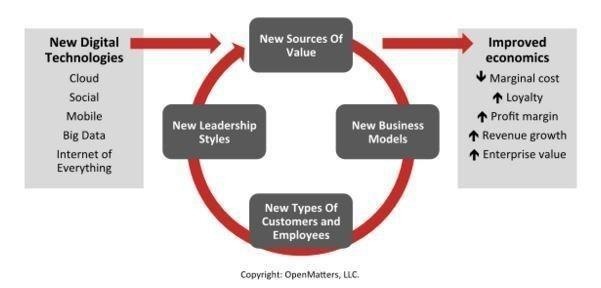Thoughts on leadership in the Digital World

The holiday period is always a good time for reflection and once my dreaded cold had calmed down, I started to reflect on some of the most influential push buttons of business and “leadership” firmly came to mind. I decided to go for a hike and picked Sabino Caynon, a significant canyon located in the Santa Catalina Mountains and the Coronado National Forest north of Tucson, Arizona, United States. Sabino Canyon is a popular recreation area for residents and visitors of Southern Arizona, providing a place to walk, hike or ride. Minutes away from the desert are large waterfalls along Sabino Creek with minor bridges constructed over them. Wildlife in the canyon includes deer, javelina, skunks, tortoises, rattlesnakes and mountain lions.

As I started to climb this magnificent caynon, I reminisced with the new Millennium and the Information Age which is setting the stage for a changing world. Wheatley states that information is a dynamic element that gives way to order, growth and defines what is alive. It is with this fluid movement of information that we see change. “This is the world of ‘Darwin’ where we have to change to survive; where we have to develop to thrive; and paradoxically, where the very act of change increases the risk that we will not survive”. It is a world now of mergers, down-sizing, reorganisation, diversity and more women in the workplace.
So let’s now move to leadership, my understanding of leadership is that leadership is the ability to motivate groups of people towards a common goal, an incredibly important skill in today’s business world. Without strong leadership, many otherwise good businesses fail. Understanding the characteristics of strong leaders and cultivating those skills is paramount for those pursing a career in business.
Many of the world’s most respected leaders have several personality traits in common. Some of the most recognisable traits are the ability to initiate change and inspire a shared vision, as well as knowing how to “encourage the heart” and model the skills and behaviours that are necessary to achieve the stated objectives. Good leaders must also be confident enough in themselves to enable others to contribute and succeed.
Let’s now look at some of the most recognised model leaders from the past:
The Ability to Initiate Change — Franklin D. Roosevelt
Good leaders are never satisfied with the status quo and usually take action to change it. In addition, strong leaders bring about change for the common good by involving others in the process. Roosevelt. sought practical ways to help struggling men and women make a better world for themselves and their children. His philosophy was, “bold, persistent experimentation…Take a method and try it. If it fails, admit it frankly and try another. But above all, try something.” Being willing to take risks by trying new ideas and involving others in the process of change is a key quality of strong leaders.
Inspiring a Shared Vision — The Leadership of Martin Luther King
Leaders, through their words and actions, must have the ability to draw others into a common vision by telling others where they intend to go and urging them to join in that vision. Martin Luther King’s vision of a country free from racial segregation and discrimination, so poignantly expressed in his famous “I have a dream…” speech, exemplifies this critical leadership trait. King had a vision of a better America, and his ability to bring both whites and blacks together to march against segregation changed America profoundly.
Model Leadership — Mohandas K. Ghandi
Strong leaders not only need to have a vision and the ability to initiate change, they must model the values, actions, and behaviors necessary to make the vision reality. Ghandi not only created and espoused the philosophies of passive resistance and constructive non-violence, he lived by these principles. According to Indira Gandhi, “More than his words, his life was his message.” By choosing to consistently live and work in a manner that exemplified the values he believed in, Ghandi engendered trust, becoming a role model for others looking to affect change without resorting to violence.
Encouraging the Heart — The Leadership of Winston Churchill
On December 29, 1940, London was hit by one of the largest aerial attacks of World War II. Somehow, St. Paul’s Cathedral survived. Two days later a photo showing a silhouette of the dome of St. Paul’s, surrounded by smoke and flames ran in the paper with a caption that read, “It symbolises the steadiness of London’s stand against the enemy: the firmness of right against wrong.” Churchill recognized the importance of St. Paul’s as a morale booster. His instructions were clear on that December night, “At all costs, St. Paul’s must be saved.” Leaders must be able to encourage the hearts of those who share their vision, providing a sense of confident optimism even in the face of enormous difficulties.
Traditional skills have not been supplanted but they now co-exist and very visually have survived with a mix of new factors.
First of all, digital leadership can be defined by a leader’s contribution to the transition toward a knowledge society or community and their knowledge of technology. Digital leaders have an obligation to keep up with the ongoing global revolution. They must understand technology, not merely as an enabler but also for its revolutionary force.
Leadership must be driven by an attitude of openness and a genuine hunger for knowledge. Of course, no rule dictates that leaders must be literate in coding or that they graduated from machine-learning but, there is an imperative to understand the impact of breakthrough or revolutionary technologies.
Today’s leaders must have the ability to identify technological trends across different sectors, such as big data, cloud computing, automation, and robotics. However, first and foremost they must possess sufficient knowledge and the vision to use these resources most effectively.

Secondly, in a knowledge society, what we do not know is as important as what we do know. Leaders should know their limits and know how to acquire missing knowledge. A leader of the future is more like a community manager rather than an authoritarian.
These days, we are observing the decline of traditional hierarchical models of organisation. Take a look at how the organisation of governments has changed across Western societies in recent years. A number of governments have introduced or reinforced public consultation processes as well as opened up public data for the benefit of their citizens.
These processes, by and large, will continue to grow. As a result, the hierarchical model tends to be suppressed and replaced by horizontal structures among executives, leaders from different sectors, researchers and representatives from civic society. Hierarchy fails in the digital age because it’s slow and bureaucratic, whereas the new world is constantly changing and requires immediate responses.
Information is key. In today’s world, power is not gained by expanding new territories or areas of influence but by deepening and widening networks and connections. But what is the role of the individual or leader, or of qualities that distinguish one grain of sand from another?
Having acknowledged that digital technology will play a decisive role our future, leaders cannot afford to show fear or reluctance in implementing it. Instead, they must embrace technology with a clear view of its potential. We must set sail for new, ambitious lands. We choose to go to Mars because our technology enables us to at least attempt the exploration on other planets by the 2030s. And we choose to develop other fantastic things every day – self-driving cars, more powerful batteries, the Apple Watch, drones – to name only just a few.
My conclusion is that leadership in today’s world is a balanced mix of universal characteristics and digital leadership traits which has the potential to guide us through years of transformation with optimism and idealism.Technology continues to prove that it can be used for the benefit of mankind, but only if we set sail on the right course and with smart individuals that make our journey, progress, and performance so much worthwhile.
Robin S. Sharma once said:
“Leadership is not about a title or a designation. It’s about impact, influence and inspiration. Impact involves getting results, influence is about spreading the passion you have for your work, and you have to inspire team-mates and customers.”
"""
Articles from Geoff Hudson-Searle
View blog
Change is inevitable. · More and more organisations today face a dynamic and changing environment. T ...

Shepherd.com - Discover Amazing Books have recently released an article on my last book The Trust Pa ...

I recently had a meeting in the City of London with a group of executives, the interesting fact was ...
You may be interested in these jobs
-

Supply Primary Teacher
7 hours ago
Direct apply
THE SUPPLY REGISTER LIMITED Bodmin, United KingdomJob Title: Supply Primary Teacher · Location: Liskeard, Bodmin, St Austell, Saltash and surrounding areas · Company Overview: The Supply Register are a managed service working alongside 4 large multi academy trusts within Devon & Cornwall. We are currently seeking enthusiastic a ...
-
Qualified Humanities Teacher
2 days ago
Direct apply
Opogo Ltd Lambeth, United Kingdom**Qualified Hamanities Teacher - Long Term** · **An 'Outstanding' school based in Lambethare seeking a Qualified Humanities Teacher to join their department on a long term basis starting ASAP.** · **About the role**: · - The school is looking for an passionate and committed Human ...
-

Health & Safety Advisor
8 hours ago
Energy Jobline CVL Chichester, West Sussex, United KingdomHealth & Safety Advisor Chichester, West Sussex 8 month temporary £28.15 per hour (Umbrella company basis) · Our client a leader within the manufacturing industry are seeking a Health & Safety Advisor on a temporary basis within their site based in Chichester, West Sussex. Job De ...
Comments